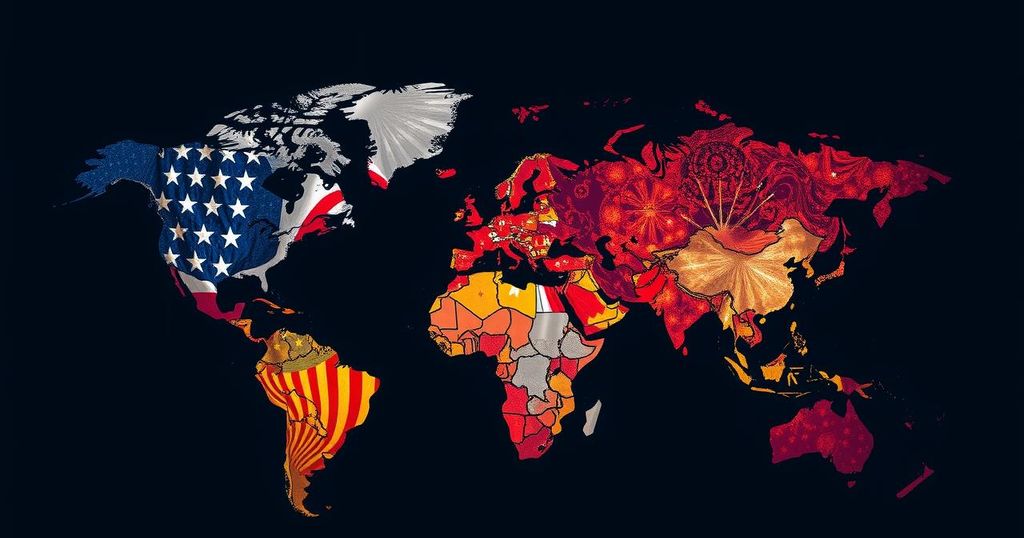Impending U.S. Presidential Election: Implications for Domestic and Global Stability

The impending U.S. presidential election on November 5 features candidates Kamala Harris and Donald Trump, each promoting extremist views that raise concerns for domestic and global politics. With significant voter registration and attention from international observers, the policies suggested by both candidates reflect a troubling disregard for human rights, offer unwavering support for Israel amidst ongoing conflicts, and an unsustainable approach to climate change. Analysts predict that the election’s outcome could exacerbate extreme political ideologies and environmental challenges, influencing global stability.
As the United States approaches a pivotal presidential election on November 5, the discourse surrounding the leading candidates, Vice President Kamala Harris and former President Donald Trump, raises significant concerns about the implications of their respective policies for both domestic and international landscapes. The election, considered by many observers to be transformative, will take place under a shadow of pressing issues that affect not only the American populace but also global geopolitics. The current political environment has witnessed more than 160 million voters registered, indicating a substantial engagement among constituents. Both candidates, representing divergent factions within American politics, have adopted and perpetuated extremist views that may foreshadow a troubling trajectory for international relations. While Harris’s administration may suggest a softening of certain policies, such as hinted halts in military support to Israel, aides have indicated that these are mere political postures rather than actionable commitments. Trump, on the other hand, remains steadfast in promoting unencumbered support for Israel, underpinned by alliances with Christianist factions that envision a cataclysmic reckoning linked to Israel’s geopolitical maneuvers. Furthermore, both candidates have shown a reluctance to adhere to international norms, notably dismissing the rulings of the International Court of Justice regarding Israeli actions and conducting themselves in defiance of established human rights protocols. This disregard is symptomatic of a broader tendency rooted in a national history marked by colonialism and xenophobia. Both Harris and Trump have signaled intentions to fortify stricter immigration policies, contrasting sharply with the United States’ historical identity as a haven for immigrants, thus perpetuating outdated narratives of exclusion and division. Additionally, the candidates’ campaigns reflect a troubling indifference to the global climate crisis, with vocal support for fossil fuel extraction methods such as fracking and hesitance to participate in critical international environmental agreements. This is particularly paradoxical given the US’s self-proclaimed status as a global leader, which seems increasingly disconnected from other nations’ urgent calls for sustainability and cooperation. In light of these considerations, political analysts express trepidation regarding the potential ramifications of the election outcome on the Caucasian bloc, especially in Europe. There exists a real concern that regardless of which candidate prevails, the resultant policies could embolden extreme political ideologies, exacerbate existing environmental challenges, and incite regional instability reminiscent of the tumultuous conflicts experienced in the last century. Such a situation would compel the international community to grapple with the consequences of American electoral decisions that reverberate far beyond its borders.
This article explores the implications of the upcoming U.S. presidential election, highlighting the positions of the main candidates, Kamala Harris and Donald Trump, as they grapple with pivotal issues such as foreign policy towards Israel, immigration, historical injustices, and climate change. Both candidates have espoused controversial stances that raise concerns not only among U.S. voters but also within the international community, particularly regarding issues of human rights and environmental policies. Their policy frameworks may lead to significant geopolitical shifts, especially within the context of the longstanding complexities of U.S. relations with its allies and adversaries.
In conclusion, the impending U.S. presidential election presents critical challenges that are likely to shape not only the trajectory of American policies but also the dynamics of global interactions. The apparent alignment of both candidates with extreme partisan ideologies raises significant concern for the future of international relations, environmental sustainability, and adherence to human rights. The outcome of this election could solidify a troubling status quo, perpetuating cycles of conflict and neglect that resonate deeply within the Caucasian bloc and beyond.
Original Source: www.aljazeera.com







